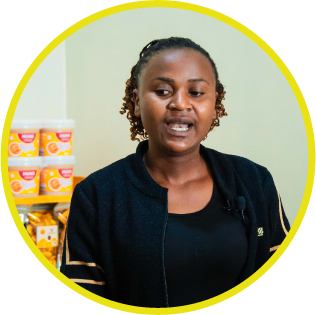COUNTRY-LED, PEOPLE-POWERED
Country-led Transformation
- Home
- Country-led Transformation

Country-led Transformation:
Building Resilience and Market Competitiveness Across Africa
In 2024, AGRA deepened its commitment to country-led transformation by aligning integrated investments with national, regional, and continental priorities. With a clear focus on two overarching objectives—building resilience, and enhancing market and sector competitiveness. In some countries, these objectives are pursued in tandem, recognizing that resilience and competitiveness are mutually reinforcing drivers of agricultural transformation. This move away from isolated programmatic results toward integrated, country-driven systems change marks a decisive evolution under Strategy 3.0.
2024 Progress Across AGRA’s 12 Focus Countries
Building resilience in challenging contexts
In partnership with governments and local institutions, AGRA supports efforts to strengthen the agricultural sector’s ability to absorb climatic, economic, and institutional shocks. In this context, resilience refers specifically to the production side of agriculture—ensuring that farmers can continue to grow enough food, even in the face of disruptions. By helping national systems and producers withstand and adapt to these shocks, we contribute to long-term food security and more stable rural livelihoods.
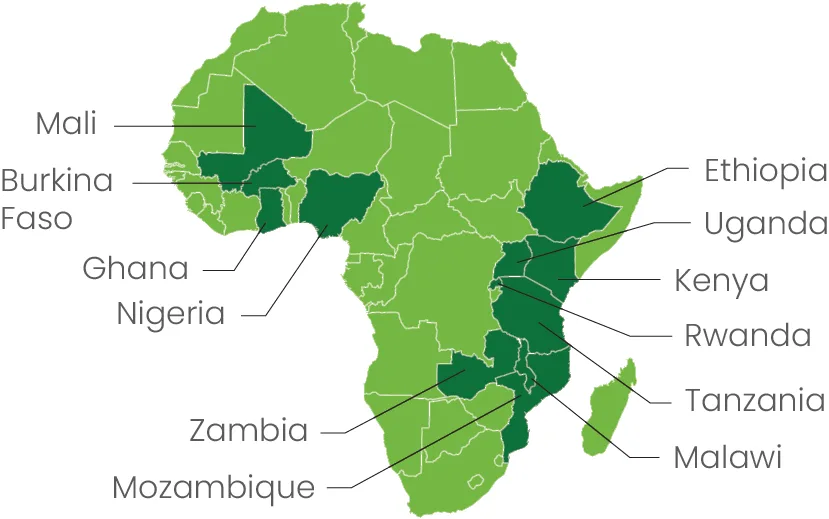
From survival to surplus: Farmer testimonials from Nigeria
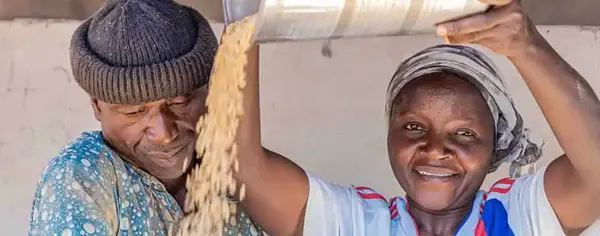
Phoebe Maitala, Kahuta
“It felt like a miracle.” With support from the AGRA-backed Gender Consortium, Phoebe doubled her maize yield from 20 to 45 bags per hectare using improved seeds and precision spacing. She now runs a small processing business, turning grains into flour, baby food, and other high-value products, thus boosting her income and helping fund her children’s education.

Charity Ezekiel, Kaduna State
“The plant is like a dream come true!” Through AGRA’s partnership with Palm Valley, Charity increased her harvest from 10 to 34 bags per hectare using fertilizer placement and modern techniques. With access to a local processing facility, she now adds value to her maize and rice, sells directly to consumers, and mentors other women to see farming as a business.
Top-line results by country | Building resilience
Burkina Faso
Supported investment models to build resilience to climate shocks and insecurity. Identified anchor firms and tailored financial products to strengthen off-taker schemes.
Ethiopia
Partnered with the Ethiopian Institute of Agricultural Research to expand early-generation seed supply, strengthening seed systems and boosting food security for 302,000 smallholders.
Mali
Supported adoption of the National Agricultural and Food Systems Investment Plan, advancing resilience through national food systems planning.
Mozambique
Supported the government’s Seed Law, Policy, and Investment Plan in collaboration with key public and private partners.
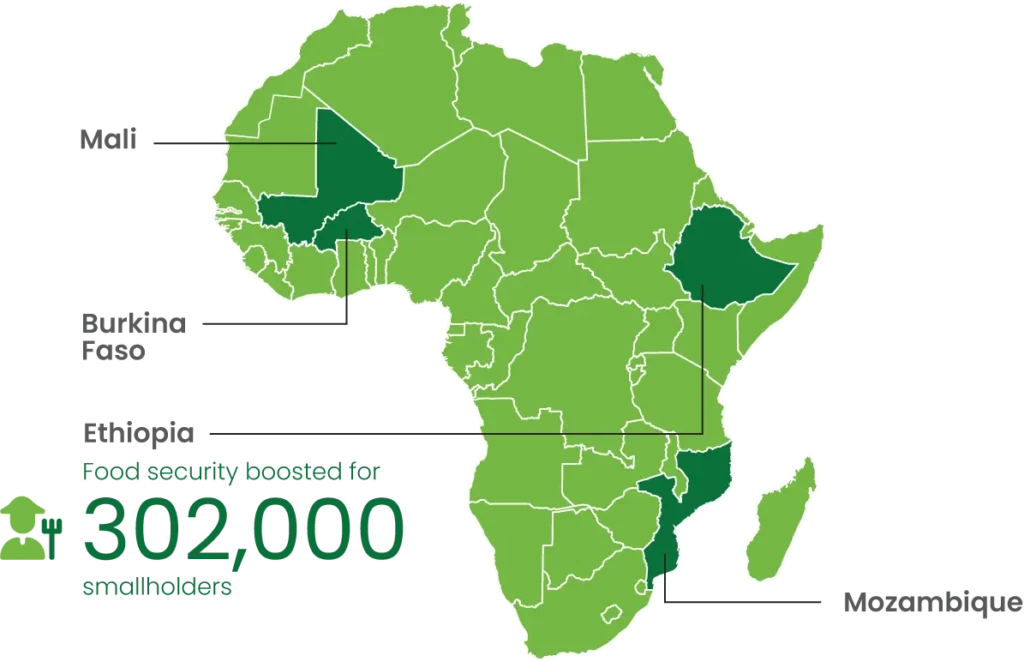
Strengthening resilience through nutrition
Building agricultural resilience is multifaceted. It means not only increasing yields but also ensuring that harvests reach those who need them most, while supporting broader health and development goals. AGRA and its partners are expanding access to biofortified crops like high-iron beans and vitamin A maize, helping countries improve food security and nutrition at the same time.
Strengthening resilience through policy and state capability: The case for fertilizer and soil
Healthy soils are the foundation of resilient, productive agriculture. Yet across Africa, declining soil fertility and limited access to affordable, appropriate fertilizers limits farmers’ yields and threatens food security and climate resilience. Access to the right soil nutrients can mean the difference between going hungry and maintaining a sustainable livelihood.
Recognizing this, AGRA has prioritized support to national and regional efforts that strengthen the enabling environment for sustainable soil and fertilizer management.
In 2024, AGRA played a catalytic role in one of the continent’s most significant policy events on soil health in over a decade. The 2024 Africa Fertilizer and Soil Summit helped countries to set targets for improving fertilizer use, reaching smallholder farmers, and implementing integrated soil health management practices. The targets form part of each country’s agricultural investment plans and national policies. Those plans are supported by regional and continental frameworks and fertilizer regulations, strategy and subsidy programs that can be aligned with neighboring countries.
Enhancing Market and Sector Competitiveness
In countries with relatively strong production capacity, AGRA works with partners to enhance market and sector competitiveness by strengthening the broader agricultural ecosystem. This includes supporting governments to improve the enabling environment for value chain development, strengthening regulatory systems, and investing in anchor firms and service providers. These efforts aim to increase the value of crops, reduce systemic barriers, and ensure that farmers and agri-SMEs can access reliable, profitable markets for their products.
Top-line results by country | Enhancing market and sector competitiveness
Ghana
Established an inter-ministerial platform to improve agricultural coordination and youth engagement across nine ministries, while delivering certified seed and subsidized fertilizer (“Grow Ghana Initiative”) to over 100,000 farmers to boost rice and soybean productivity and market competitiveness.
Rwanda
Engaged over 20,500 youth in high-value horticulture value chains with strong export potential.
Tanzania
Facilitated USD 129M AfDB youth program for enhanced access to land, finance, and markets.
Uganda
Strengthened regulatory systems, enabling a 211% increase in structured maize exports.
Zambia
Designed USD 950M investment plan aligned with national agricultural priorities under NAIP II/CATSP.
How AGRA’s technical approach supports market and sector competitiveness
To enhance market and sector competitiveness, AGRA works with governments and partners to strengthen agricultural value chains that offer high potential for national food security and economic development. Each country identifies a set of primary and secondary value chains, then applies a tailored, integrated approach to address its distinct challenges. For primary value chains, AGRA mobilizes its full range of technical expertise—spanning seed systems, sustainable farming, inclusive markets, and enabling policy—to address bottlenecks across the entire value chain.

Unlocking intra-African trade through AfCFTA: A game changer for African agribusiness
In 2024, AGRA worked alongside governments and private sector actors to strengthen national policies, value chain competitiveness, and trade-enabling infrastructure, laying the groundwork to harness the opportunities of the AfCFTA. As AfCFTA implementation progresses, reduced tariffs and non-tariff barriers are opening new market opportunities for farmers, aggregators, and agri-food SMEs across Africa. AGRA’s trade facilitation work in Nigeria, Ghana, and Kenya is aligned with AfCFTA objectives, supporting regional value chains and export potential for key crops like maize, rice, soybean, and horticulture.
AGRA’s work is helping ensure that smallholder farmers and domestic enterprises are positioned to benefit from
a more integrated continental market.
For secondary value chains, AGRA focuses on identifying and investing in anchor firms—local businesses that source from smallholder farmers and operate or are willing to adopt inclusive business models. These firms serve as catalytic entry points for strengthening supply chains, delivering inputs and extension, and improving access to markets. This dual approach—targeting both value chain development and ecosystem building—ensures that market competitiveness is grounded in local realities and supports inclusive, durable transformation.
How AGRA’s technical approach supports market and sector competitiveness
Policy reforms and institutional coordination are not abstract achievements—they lay the groundwork for functional, inclusive markets. In 2024, AGRA sharpened its focus on the real-world constraints facing farmers, agripreneurs, and SMEs, ensuring that policy efforts translate into improved market access, stronger value chains, and more competitive agricultural sectors.
The endorsement of the Kampala CAADP Declaration by 11 African Heads of State in early 2025 is one such milestone. Anchored in the groundwork laid throughout 2024, the declaration signals a recommitment to implement country-led National Agricultural and Food Systems Investment Plans (NAFSIPs)—comprehensive, costed roadmaps that align agricultural priorities with investment. These plans are critical to enabling more transparent, coordinated, and market-responsive agricultural development across the continent.
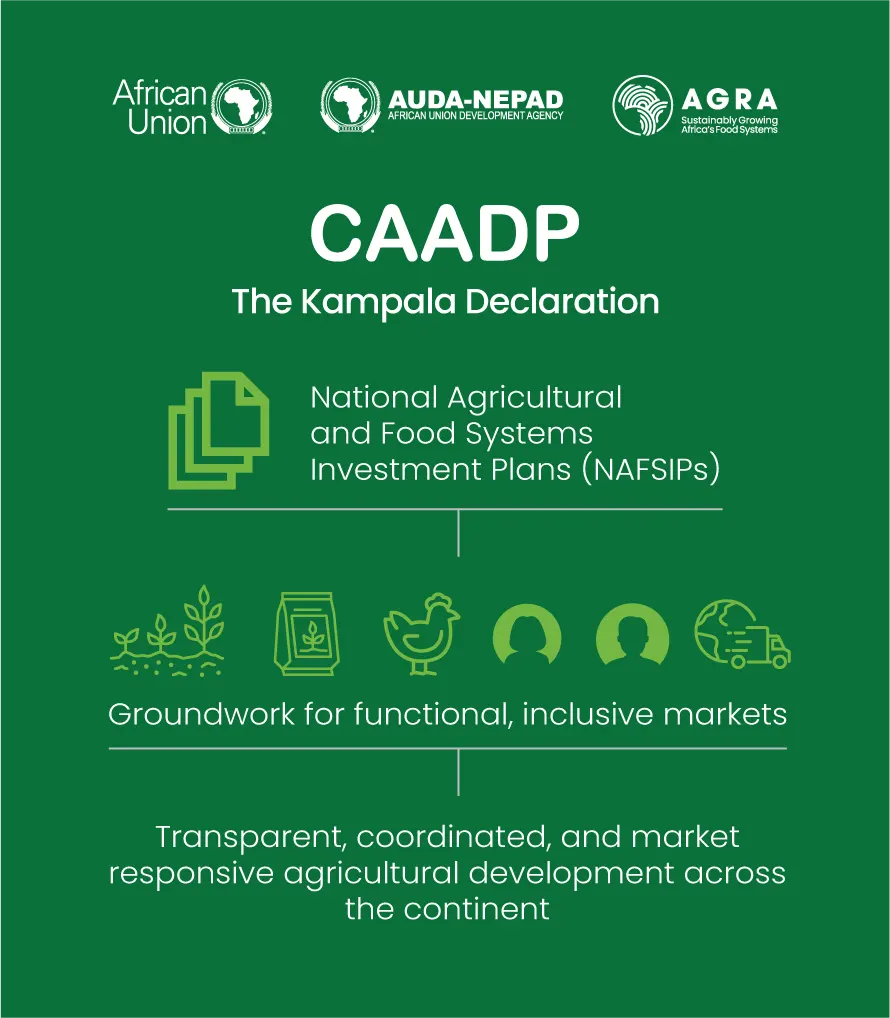
Building Resilience and Enhancing Market and Sector Competitiveness
While some countries require targeted efforts on either the production or market side, many face challenges across the full agricultural value chain. In these contexts, AGRA and its partners adopt an integrated approach that simultaneously strengthens resilience—by improving agricultural productivity and sustainability—and enhances market access by developing inclusive value chains and supporting private sector participation. This dual-track strategy reflects the reality that building food security and rural prosperity often requires addressing both supply and demand constraints in tandem.
Top-line results by country | Building resilience and enhancing market and sector competitiveness
Malawi
Strengthened youth engagement and access to inputs and markets, reaching over 463,000 farmers in climate-sensitive systems.
Kenya
Scaled regenerative agriculture models across four counties, enabling 118,000+ farmers to adopt sustainable practices and boost resilience. Laid critical groundwork to address Kenya’s double taxation challenge and continues to remove binding constraints to inter-county trade.
Nigeria
Delivered advisory services to over 250,000 farmers on climate-smart practices, advancing resilience in key staple value chains. Strengthened seed traceability systems through the Seed Codex, boosting farmer trust and uptake of improved varieties.
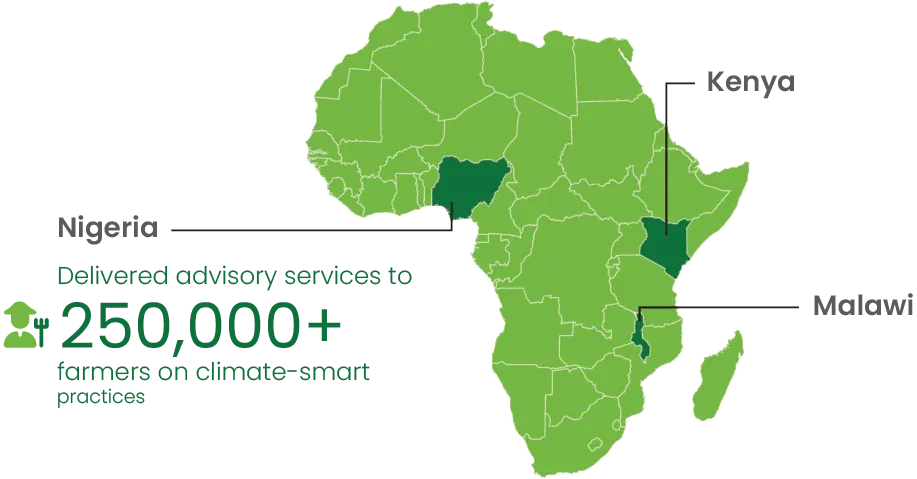
How AGRA’s technical approach supports market and sector competitiveness
A resilient, market-oriented agricultural sector begins with one essential input: seed. In 2024, AGRA scaled its investment in national seed systems, recognizing their central role in climate adaptation and inclusive market development. By ensuring that smallholder farmers have access to high-quality, locally adapted seed varieties, AGRA is helping countries to boost productivity, respond to environmental shocks, and align domestic production with commercial demand. This work is underpinned by strong policy engagement, private sector partnerships, data-driven planning tools like Seed System Assessment Tool (SeedSAT), and national seed investment plans.
SeedSAT is an innovation that provides a structured approach for governments and other stakeholders to systematically identify gaps and weaknesses in national seed systems across various thematic areas. The SeedSAT provides a framework for structured assessment, thereby facilitating data-driven decisions and targeted interventions to strengthen seed production, distribution, and adoption.

Seed systems goal: Strengthen seed systems across Africa to ensure farmers have consistent access to high-quality, locally appropriate seed varieties—supported by strong policies and institutions that drive productivity and resilience.
Our seed systems work is guided by the simple truth:

In 2024, AGRA supported national seed investment plans—strategic tools to help countries accelerate the development of robust seed systems. These plans identify systemic gaps, align public and private investments, strengthen regulatory frameworks, and support local seed enterprises to improve smallholder access to high-quality, climate-resilient seed.
The plans build on evidence gathered through AGRA’s SeedSAT, conducted in 17 countries from 2022-2023 in partnership with governments and private sector actors. In 2024, AGRA completed an additional six seed assessments using SeedSAT and developed seed investment plans for Kenya, Uganda, Ethiopia, Malawi, Ghana, and Nigeria. An additional five plans are underway for Burkina Faso, Mali, Rwanda, Tanzania, and Mozambique. All plans are co-developed with national ministries of agriculture to ensure ownership and long-term uptake.
Unlocking intra-African trade through AfCFTA: A game changer for African agribusiness
Research & development
Breeding of improved, climate-resilient, or high-yielding varieties (often by national research institutes or universities)
Seed production
Multiplication of breeder seed into foundation and certified seed by seed companies, cooperatives, or public agencies
Seed regulation & certification
Government policies and agencies that oversee quality control, varietal registration, and phytosanitary standards
Distribution & access
Mechanisms to ensure farmers—especially smallholders—can access affordable, high-quality seeds (through agro-dealers, cooperatives, or extension services)
Farmer use & feedback
Adoption at farm level and feedback to improve variety performance AGRA’s seed system work is supported by its Center of Excellence for Seed Systems in Africa (CESSA)
AGRA started CESSA in 2021 as a one-stop center for increasing the availability of quality seeds for African farmers. CESSA strengthens the seed value chain through the production and release of both early generation and certified seed. It drives farmer awareness of climate-smart seed options and encourages uptake of seeds that meet market and ecological demands. The goal is to increase production, resilience and profitability for African farmers.
CESSA
- Trains seed breeders
- Supports the establishment of small and medium-sized seed companies
- Advocates policy reforms that support the growth and development of seed systems in Africa
- Develops digital tools for better seed quality control
- Drives knowledge exchange across research, policy, and industry
- In November 2024, CESSA held a Seed Industry Stakeholders Learning Event in Kampala, Uganda that brought together stakeholders from the seed sectors in 12 African countries to share best practices and develop collaborations to bridge gaps across research, policy, and industry.


